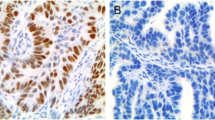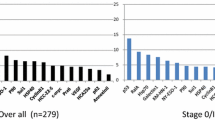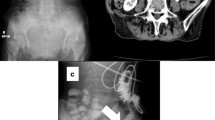Abstract
The aim of this study to determine whether serum p53 protein and antibodies are associated with malignant tumors. A case–control study was conduct in 569 patients with various types of malignant tumors and 879 healthy controls. Serum p53 protein and antibodies were analyzed by enzyme-linked immunosorbent assay (ELISA).The rate of positive p53 protein in patients with various malignant tumors was 4.22% compared with 0.34% in healthy controls (P < 0.001). The rate of anti-p53 antibodies in patients with various malignant tumors was 14.59% compared with 1.02% in healthy controls (P < 0.001). The adjusted odd ratio (OR) for p53 protein was 17.55 (95% CI = 4.98–61.94). The adjusted odd ratio for anti-p53 antibodies was 14.27 (95% CI = 6.75–30.16). The study strongly suggested that serum p53 protein and antibody are associated with increased cancer risk and can be used as early serological markers in the diagnosis of malignancies tumors.
Similar content being viewed by others
References
Levine AJ, Momand J, Finlay CA (1991) The p53 tumour suppressor gene. Nature 351(6326):453–456
Charuruks N, Tangkijvanich P, Voravud N, Chatsantikul R, Theamboonlers A, Poovorawan Y (2001) Clinical significance of p53 antigen and anti-p53 antibodies in the sera of hepatocellular carcinoma patients. J Gastroenterol 36(12):830–836
Lenner P, Wiklund F, Emdin SO, Arnerlöv C, Eklund C, Hallmans G et al (1999) Serum antibodies against p53 in relation to cancer risk and prognosis in breast cancer: a population-based epidemiological study. Br J Cancer 79(5–6):927–932
Schneider J, Persek P, Braun A, Bauer P, Konietzko N, Wiesner B et al (1999) p53 protein, EGF receptor, and anti-p53 antibodies in serum from patients with occupationally derived lung cancer. Br J Cancer 80(12):1987–1994
Gumus E, Erdamar S, Demirel G, Horasanli K, Kendirci M, Miroglu C (2004) Association of positive serum anti-p53 antibodies with poor prognosis in kidney cancer patients. Int J Urol 11(12):1070–1077
Wu M, Chen Q, Cu X (2006) Testing serum p53 protein by sandwich ELISA. Chin J Clin Lab Sci 24(11):448 Chinese
Wu M, Chen Q, Wang Y (2003) Preparation of egg yolk immunoglobulin (IgY) against p53 protein expressed in E coli. J First Mil Med Univ 23(5):491–493 Chinese
Wu M, Chen Q, Cu X, Wang Y (2006) Development of ELISA method for detecting serum p53 antibodies. South China J Prev Med 32(6):19–21 Chinese
Shen H, Chen Q (2000) New concepts and methods of standardizing predictive value, accuracy and incorrect diagnostic rate. Anal Quant Cytol Histol 22(1):76–79
Balogh GA, Mailo DA, Corte MM, Roncoroni P, Nardi H, Vincent E et al (2006) Mutant p53 protein in serum could be used as a molecular marker in human breast cancer. Int J Oncol 28(4):995–1002
Mocci F, Nettuno M (2006) Plasma mutant-p53 protein and anti-p53 antibody as a marker: an experience in vinyl chloride workers in Italy. J Occup Environ Med 48(2):158–164
Müller M, Meyer M, Schilling T, Ulsperger E, Lehnert T, Zentgraf H et al (2006) Testing for anti-p53 antibodies increases the diagnostic sensitivity of conventional tumor markers. Int J Oncol 29(4):973–980
Shimada H, Ochiai T, Nomura F, Japan p53 Antibody Research Group (2003) Titration of serum p53 antibodies in 1, 085 patients with various types of malignant tumors: a multiinstitutional analysis by the Japan p53 Antibody Research Group. Cancer 97(3):682–689
Soussi T (2000) p53 antibodies in the sera of patients with various types of cancer: a review. Cancer Res 60(7):1777–1788
Yamaoka K, Mitsunobu F, Kojima S, Shibakura M, Kataoka T, Hanamoto K et al (2005) The elevation of p53 protein level and SOD activity in the resident blood of the Misasa radon hot spring district. J Radiat Res (Tokyo) 46(1):21–24
Li Y, Karjalainen A, Koskinen H, Hemminki K, Vainio H, Shnaidman M et al (2005) p53 autoantibodies predict subsequent development of cancer. Int J Cancer 114(1):157–160
El Far MA, Atwa MA, Yahya RS, El Basuni MA (2006) Evaluation of serum levels of p53 in hepatocellular carcinoma in Egypt. Clin Chem Lab Med 44(5):653–656
Sakamoto M (2001) P53 in sera for the early detection of hepatocellular carcinoma. J Gastroenterol 36(12):865–866
Goodell V, Salazar LG, Urban N, Drescher CW, Gray H, Swensen RE et al (2006) Antibody immunity to the p53 oncogenic protein is a prognostic indicator in ovarian cancer. J Clin Oncol 24(5):762–768
Chae BJ, Bae JS, Lee A, Park WC, Seo YJ, Song BJ et al (2009) p53 as a specific prognostic factor in triple-negative breast cancer. Jpn J Clin Oncol 39(4):217–224
Shen YC, Hu FC, Jeng YM, Chang YT, Lin ZZ, Chang MC et al (2009) Nuclear overexpression of mitotic regulatory proteins in biliary tract cancer: correlation with clinicopathologic features and patient survival. Cancer Epidemiol Biomarkers Prev 18(2):417–423
Author information
Authors and Affiliations
Corresponding author
Additional information
This study was supported by the Bureau of Science and Technology of Guangzhou City (Grant No. 2000-Z-111-01).
Rights and permissions
About this article
Cite this article
Wu, M., Mao, C., Chen, Q. et al. Serum p53 protein and anti-p53 antibodies are associated with increased cancer risk: a case–control study of 569 patients and 879 healthy controls. Mol Biol Rep 37, 339–343 (2010). https://doi.org/10.1007/s11033-009-9744-7
Received:
Accepted:
Published:
Issue Date:
DOI: https://doi.org/10.1007/s11033-009-9744-7




